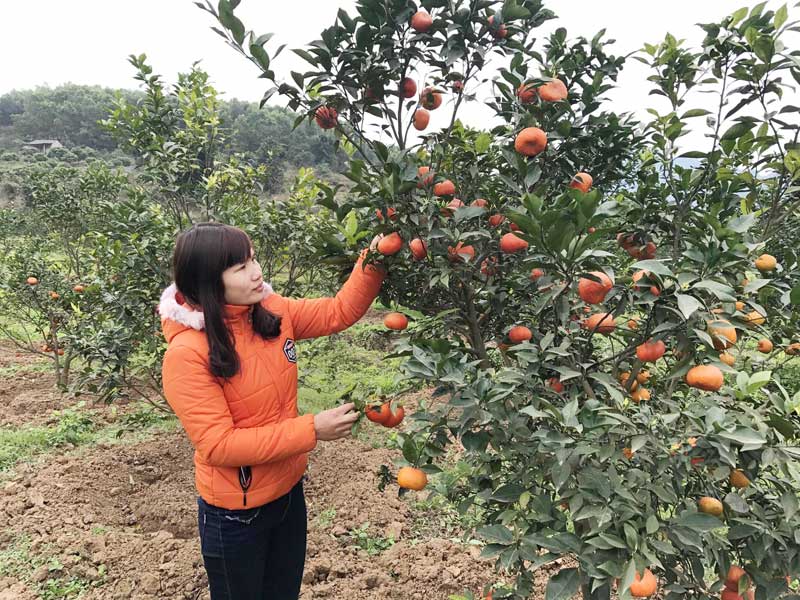



Thanks to the renovation of the mixed garden
area, the model of planting Canh Oranges brought to the family of Ms. Bui Thi
Ly (Que Su village, Cao Ram commune, Luong Son district) with an earning from
200-300 million dongs / year.
In the past three years, in order to
restructure agriculture towards sustainable direction, the commune has actively
connected with the market of agricultural products to find out stable output;
looking for enterprises investing and producing under the value chain. At
present, in the commune area, there are areas of planting fruit trees formed
with a total area of 120.7 hectares, of which more than 30 hectares of oranges
and grapefruits were planted in 2017 in villages of Khuoc, Hui, Que Su;
planting 27.8 hectares of longans in Vai Dao hamlet; growing over 3,000 m2 of
organic vegetables in Sang hamlet; raising mountainous pigs and local chickens
in Que Su village. There have been many good and typical farmers with economic
models which earned an income of 300-400 million dongs per year.
Que Su and Khuoc villages have a strong
"change by themselves" with nearly 60 hectares of planting Canh
Oranges, V2 Oranges, Dien Grapefruits ... In 2015, from the movement of
renovating the mixed garden, the people of Que Su village expanded the area of
planting citrus trees from nearly 10 hectares to nearly 30 hectares now. The
recent orange harvest has been greatly succeeded and brought an income about
200-300 million dongs, like Ms. Bui Thi Ly's model (Que Su village) with the 4-
hectare area; Mr. Nguyen Van Bien (Que Su) with an area of nearly 3 hectares.
Similarly, Khuoc hamlet also appeared many outstanding farmers with citrus
planting models which brought to an income of hundreds of million dongs such as
Mr. Nguyen Huu Mung with the area of nearly 3 hectares planting Canh oranges,
Mr. Tran Xuan Hien with the model of a complex farm: animal husbandry, planting
oranges, Dien grapefruits ... In addition, Que Su has appeared many effective breeding
models such as raising wild pigs of Mr. Hoang Van Thuan with the income of 500
- 600 million dongs per year, Mrs. Le Thi Ha raises 3,000 small chickens for
the income of 100 million dongs per year ...
Taking advantage of the mountainous terrain,
people in Vai Dao hamlet, Trai Moi village actively expand the area of
planting longan, applying advanced science and technology in order to build
up a brand name in the market. At present, Vai Dao village has 20 growing
households with the total area of 27.8 ha. With a stable selling price of
25,000 - 27,000 VND / kg, the households of Mr. Dinh Cong Thang, Mr. Dinh Van Dung (Vai Dao village), Mr. Nguyen Van
Thang (Trai Moi village) all have income of 100-200 million dongs / year. In
addition, many companies such as Tam Dat Co. Ltd. and Vinagap have actively
invested in expanding organic vegetable growing areas in the hamlets of Sang
and Trai Moi, applying the guarantee system together with PGS – Participatory
Gurantee System to certify reliable products for organic products, high
productivity, concentrated purchasing, contributing to promoting agricultural
production, developing clean agricultural products, ensuring the quality and
food hygiene.
Thanks to bravely changing the structure of
plants and animals, changing the way and how to do, until now, the average
income of the commune reaches at 29 million VND / person / year, the rate of
poverty households in 2017 was 7.1%, decreased by 2.93% compared to 2016.